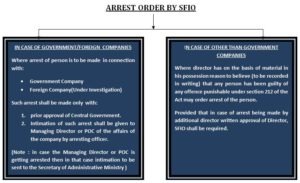POWER TO ARREST AS PER COMPANIES ACT, 2013
By Smriti Wadehra, (corplaw@vinodkothari.com).
The Companies Act, 2013 (‘Act’) empowers the Central Government to inspect the books of accounts of a company, to direct special audit, to order investigation into the affairs of a company and to launch prosecution for violation of the Act. These inspections are designed to ensure that the companies conduct their affairs in accordance with the provisions of the Act, and there is no mismanagement which may adversely affect the interest of the stakeholders. It further also keeps a check on any unfair practices prejudicial to public interest that is being resorted to by any company or a group of companies.
In light of this and the rise in financial crime, the need for a specialised agency to do cutting edge investigation and ensure quick closure of cases was necessitated. Accordingly, section 212 was introduced in the Act, however, the provisions of section relating to Serious Fraud Investigation Office (SFIO), was notified only on 1st April, 2014 except sub-section (8) to (10). SFIO is a multi-disciplinary organisation, consisting of experts, for detecting and prosecuting or recommending for prosecution of white collar crimes and frauds.
The main intent of SFIO is to prosecute corporates liable for corporate offence under the Act. Since, the definition of offence was not very clear and references were provided to various sections of the Act, there was a need to clear the ambiguity in this regard. In this regard, Companies (Amendment) Act, 2015 substituted the references to the section of offences with “Offences covered under section 447 of the Act”[1].
POWER TO ARREST
Ministry has recently come out with a notification G.S.R. 1062(E)[2] dated 24th August, 2017 making the provisions of section (8) to (10) of section 212, applicable and bestowing the power to arrest on the Act. The provisions of the section specifically lays down that every Director, Additional Director or Assistant Director of SFIO, authorised by the Central Government may by general or special order, if it has reasons to believe on the basis of material in his possession that any person under investigation is guilty of any offence punishable under sections referred to in sub-section (6), may arrest such person and shall, as soon as may be, inform him of the grounds for such arrest. Further, the provisions of Sub-section (9) and (10) of the section, provides light on the procedure of conducting such arrest by the Director and rules as mentioned below. These rules shall come into force from the date of their publication in Official Gazette i.e. 24th August, 2017.
PROCEDURAL REQUIREMENTS
- The Director, Additional Director or Assistant Director, while exercising powers under sub-section (B) of section 212 of the Act, shall sign the arrest order together with personal search memo in the Form appended to these rules and shall serve it on the arrestee and obtain written acknowledgement of service.
- The Director, Additional Director or Assistant Director shall forward a copy of the arrest order along with the material in his possession and all the other documents including personal search memo to the office of Director, SFIO in a sealed envelope with a forwarding letter after signing on each page of these documents, so as to reach the office of the Director, SFIO within twenty four hours through the quickest possible means.
- An arrest register shall be maintained in the office of Director, SFIO and the Director or any officer nominated by Director shall ensure that entries with regard to particulars of the arrestee, date and time of arrest and other relevant information pertaining to the arrest are made in the arrest register in respect of all arrests made by the arresting officers. Entry shall be made immediately on receipt of documents.
- The provisions of the code of criminal Procedure, 1973(2 of 1974), relating to arrest shall be applied mutatis mutandis to every arrest made under this Act
- Arrest order together with supporting papers shall be preserved for a period of five years from:
(i) Date of judgement or final order of Trial court (in cases where judgement has not impugned in appellate court),OR
(ii) Date of disposal of the matter before appellate court (in case the judgement is impugned)
[WHICHEVER IS LATER]
CONCLUSION
Although it was difficult to prevent white-collar crime or corporate crimes, it wasn’t necessarily difficult to commit the same. This is the reason why the evolution of SFIO was important. SFIO has emerged with the main object of improving work practices among the corporates by imposing corporate criminal liability. If an individual who has committed a crime cannot be identified and there is no mechanism for corporate prosecution, the harmful practices would continue unbated. To avoid such a situation, SFIO acts as a corporate watchdog for critical research into corporate power and its doings. To conclude, we can say that corporate crimes are much in vogue today, and so are the methods to tackle them.
[1] http://www.mca.gov.in/Ministry/pdf/AmendmentAct_2015.pdf
[2] http://www.mca.gov.in/Ministry/pdf/companiesArrestsconnectionSFIORule_25082017.pdf


Leave a Reply
Want to join the discussion?Feel free to contribute!